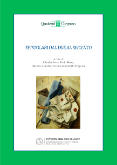
Pubblicato 22.12.2018
Parole chiave
- Lettere familiari,
- Niccolò Machiavelli,
- carteggio privato,
- carteggio semiufficiale,
- carteggio ufficiale
- corpus di lettere,
- periodizzamento,
- tipologie dei carteggi,
- finalità critica dell’epistolario ...Più
Come citare
Abstract
Unlike other humanists, Niccolò Machiavelli did not select his own letters with a view to creating a literary work (Epistles), nor did he even think to preserve them in a letterbook, preferring simply to store away some of the private and official correspondence he received from important figures of his day. Half a century after his death, his nephew Giuliano de’ Ricci sought out copies of his uncle’s letters among the archives of prominent Florentine families (the Tosinghi, Vettori and Guicciardini). The number of surviving letters written by Machiavelli himself is rather small (80) compared to the number of surviving letters he received (250), while next to nothing predates 1498, the year in which Machiavelli became Chancellor and Secretary of the Republic. A considerable gap separates the large number of surviving letters (more than 6,600) that Machiavelli wrote in his official capacity as ambassador and secretary and the small number surviving from his private correspondence. The letters can be divided in two time periods: from 1498 to 1512 and from 1513 to 1527. Those of the earlier period consist principally of correspondence with colleagues, relatives and officials; those of the later period, especially those sent to Francesco Vettori and Francesco Guicciardini, were often intended as a sort of “calling card” by which Machiavelli presented himself as a political scientist. Other private letters from this period, addressed to members of his family (brothers, sons and nephews), are expressive of Machiavelli’s enduring interest in politics, historiography, military affairs and the dramatic arts.
